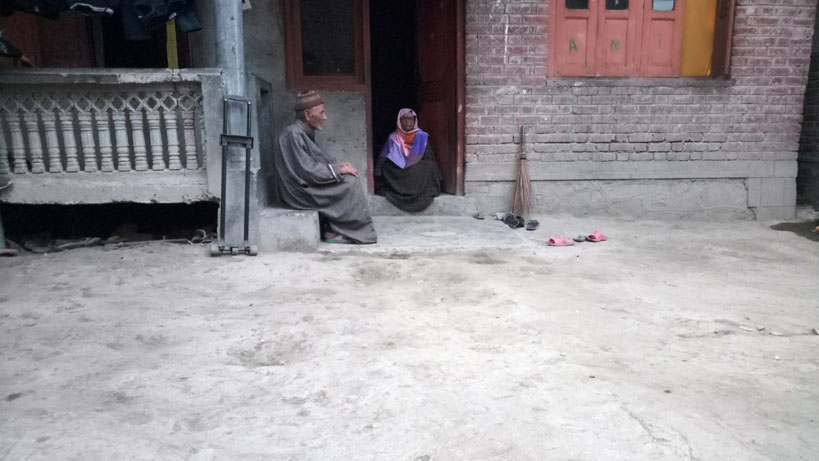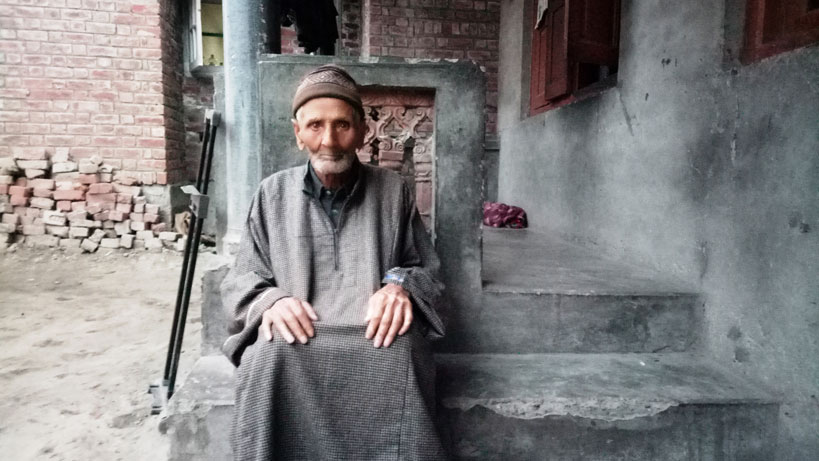The Pandit Who Heals Wounds

Arif Nazir is a Staff Writer at the Mountain Ink.
In Central Kashmir’s Budgam district, an elderly pandit is a treasured healer for commoners seeking ‘koshur ilaj’ for their burn injuries and chilblains. But beyond his ‘dast-e-shafa’, the non-migrant pandit is a symbol of Kashmir’s syncretic past.
In his poorly-lit room, Pandit Jagarnath Koul is examining the burn-scar on his patient’s hand very keenly. The revered Hakim in his eighties nods at his wife Basanti Koul, who enters the room holding a pot in her hands.
Koul takes his time to leave no part unseen of the scar that doesn’t seem unusual to him.
“Daai karri sahal,” he utters in a very low tone. Almighty will fix it.
“Elaaj gov easthie, magar parhez ti chu karun,” says Koul’s wife in an unusual Kashmiri accent. Treatment is fine, but care must go along.
She mostly speaks on behalf of her aged healer husband who’s hard of hearing.
Support Our Journalism
You are reading this because you value quality and serious journalism.
But, serious journalism needs serious support. We need readers like you to support us and pay for making quality and independent journalism more vibrant.
Mashing paste in the pot, the Pandit’s chirpy partner tells the patient, “Maaz, thool, cxaman ti noun che band.” Meat, eggs, cheese and salt tea are forbidden for you.
On her husband’s direction, she gently applies the paste on the patient’s scar, before covering it up with a leaf of Haakh, collard.
“Haakuk tea’sier chu shuhul,” she says while Koul nods in approval of perfect bandaging. Collard works like a soothing balm.
After getting treatment, the patient takes leave with blessings from ‘Bobji’, Koul’s sobriquet.
For decades, ‘Koul-jiun-aangun’—Koul’s courtyard—has remained quite a talk-hub in the locality of Hajaam-Mohalla Ompora Budgam, frequented by patients suffering from burn-scars and chilblains.
“It was his elder cousin Kashinath Koul who groomed and trained him so this Koshur-ilaj (traditional Kashmiri treatment) goes on to serve and care people,” informs Koul’s 54-year-old wife.
It was 38 years ago when Koul, then in his mid-forties, brought Basanti as a teenage bride from Bengal during his training trip there. And since then she has stayed his shadow.
Being the next in line to whom the secrets of this koshur ilaj are revealed, Koul’s wife has stepped-up with all her heart.
“Keansi waati suhoulyat, emi khoati raham cha beyi kehn,” she says. It’s a blessing if someone gets relief from this treatment.
The ingredients and their respective concentration are like a holy-secret that aren’t to be revealed out to everyone, she says.


Soon after the patient’s departure, the couple steps out on stairs of their single-storey house to embrace a fresh breeze as the autumn sunset turns everything dull and pale.
Beyond attending patients, Koul’s regular schedule goes in silence and a newspaper reading during the first half of the day. With silence, solitude has also become a dominant feature of his aged life now.
Most of his contemporaries have already passed away. Among them, his friend and neighbour Abdul Rehman’s death last year was a big blow.
“Rehman Kaakh after having dinner would come to our place and spent hours till midnight talking and discussing things with our father,” says Sunil, Koul’s elder son who would manage ‘hooka’ for the duo.
Friendship tales of the two are still talked about and praised in the neighbourhood.
“From neighbours in the house, to neighbours in the farms, they’ve lived it all together,” the healer’s son talks about the duo who also shared a mutual passion for pet-keeping.

As the loving and humble man, Koul is also known for his helping hand.
Back in the day, Sunil says, Ompora’s bus-stop would flock-up with passengers after Koul would embark on his Srinagar journey. His frank and funny side would make the villagers his captive audience.
The Pandit healer’s family perceives that being a source that they can never afford to give-up within the neighbourhood.
“We’re never left alone by our neighbours, be it any occasion,” Sunil says. “From the festivals on either side to the tough times of the 90s, we’ve stayed one.”
(This Feature appeared in the November 2020 print issue of the Mountain Ink.)
To help us strengthen the tradition of quality reading and writing, we need allies like YOU. Subscribe to us.
Mountain Ink is now on Telegram. Subscribe here.
Become Our Ally
To help us strengthen the tradition of quality reading and writing, we need allies like YOU. Subscribe to us.








